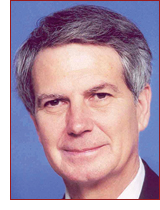July 2013: Government Affairs
Words: Walter Jones
Government Affairs
 Congressman Walter B. Jones (NC)
Congressman Walter B. Jones (NC)
All too often, the federal government implements overreaching regulations that hinder economic growth for the average American business. Whether it be excessive taxes or burdensome rules, these impediments to success are unacceptable from a government that is in place to serve its people. In many cases, new regulations that have no foundation in fact or science are issued even when adequate standards are already in place.
The Occupational Health and Safety Administration’s (OSHA) continued focus on workplace crystalline silica regulation is one such example of unnecessary government regulation in the masonry industry. Despite the fact that personal exposure limits already have been instituted to prevent workers from developing chronic silicosis, OSHA has announced that it intends to “modernize” exposure limits for construction and shipyard workers and institute new, comprehensive regulations to lower these limits.
The issue of worker health is a serious one, but piling on unnecessary regulations is not an appropriate course of action. The enormous expense of implementing the new rules proposed by OSHA would have a significant effect on the masonry industry, potentially costing tens of thousands of jobs. These regulations cross the line between ensuring that workers are operating in healthy conditions and imposing restrictions that prevent businesses from reaching their full potential.
In these tough economic times, the last thing we need is an onslaught of regulations that stifle business growth. Rather, we need to ensure that the current policies are being enforced appropriately, and that any new standards are based on tried-and-true scientific evidence. If alternative options are available to enhance worker safety, these should be considered before job-killing regulations are imposed. The independent business owners have successfully supported sound policies for workplace safety in the past. Now, OSHA is creating an environment of unsound rules and regulations.
We, in the House of Representatives, have an important role to play in the prevention of costly, overreaching government regulations. I believe it is crucial for Congress to take active steps to ensure that agencies under our oversight do not impose rules that stifle economic growth. During my time representing the Third District of North Carolina, I have continually advocated for a regulatory environment that encourages businesses to grow and prosper.
The importance of workplace safety for employees in the masonry industry cannot be overstated. However, when private businesses already have implemented safety policies, superfluous measures that will hinder the American economy are not needed. It is time for Washington to get out of the way of business growth, and I believe that the first step is to end costly, unnecessary government regulations.
Return to Table of Contents